
Dipterocarpus alatus
(MRP Inclusive of all taxes)
- Shipping ₹79 for entire order
- Dispatch in 7 days
- Country of origin: India

(MRP Inclusive of all taxes)
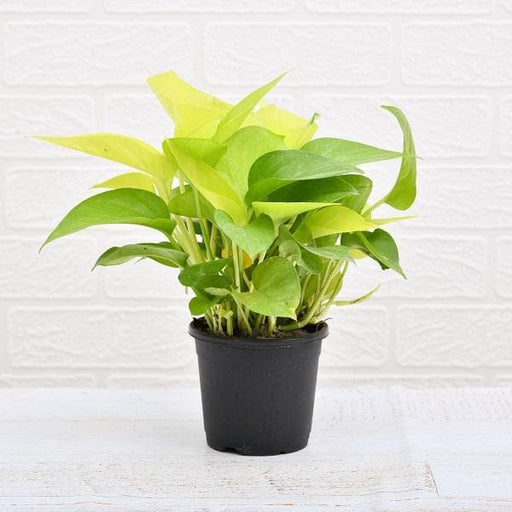 Save 29%
Save 29%
Air Purifier Money Plant with Pot The Air Purifier Money Plant, also known as Pothos or Epipremnum aureum, is a stunning indoor plant that...
View full details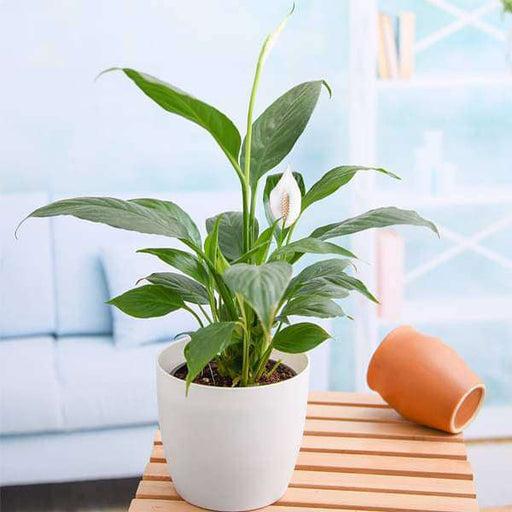
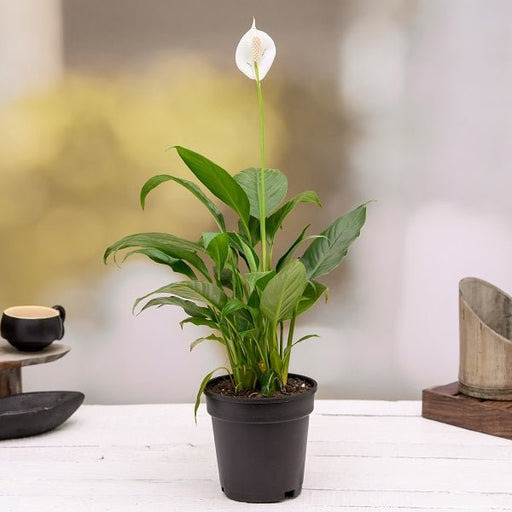 Save up to 15%
Save up to 15%
Peace Lily, Spathiphyllum - Plant The Peace Lily, scientifically known as Spathiphyllum, is a stunning houseplant celebrated for its elegant white...
View full details
 Save 25%
Save 25%
Jasminum sambac, Mogra, Arabian Jasmine - Plant Jasminum sambac, commonly known as Mogra or Arabian Jasmine, is a fragrant flowering plant...
View full details
 Save 18%
Save 18%
Combo Constituents Includes the Parijat Tree (Night-Flowering Jasmine), a culturally significant plant with fragrant flowers. Description The Pari...
View full details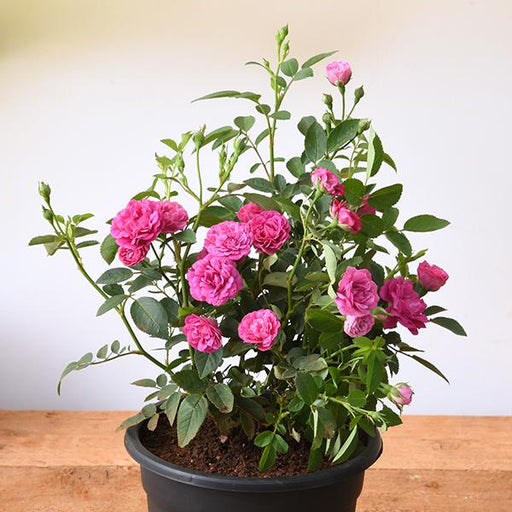
 Save 25%
Save 25%
Miniature Rose, Button Rose (Any Color) - Plant The Miniature Rose, also known as the Button Rose, is a charming and compact flowering plant that ...
View full details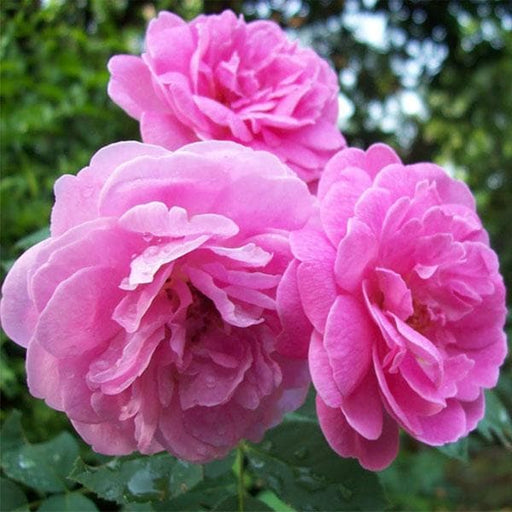 Save 25%
Save 25%
Damascus Rose, Scented Rose (Any Color) - Plant The Damascus Rose, also known as Rosa damascena, is a timeless symbol of beauty and romanc...
View full details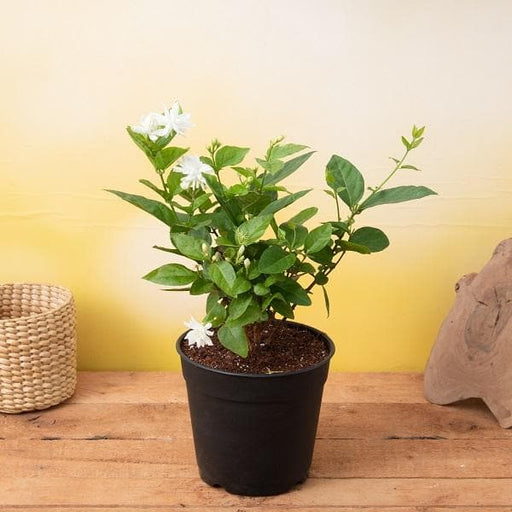
 Save 17%
Save 17%
Beautiful Fragrant Mogra, Arabian Jasmine Plant with Pot The Beautiful Fragrant Mogra, also known as Arabian Jasmine (Jasminum sambac), is...
View full details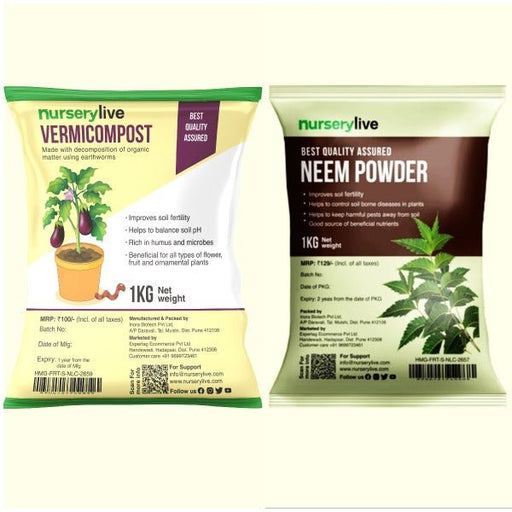 Save 15%
Save 15%
Pack of Vermicompost and Neem Cake for House Plants Transform your indoor garden with our premium Pack of Vermicompost and Neem Cake, spec...
View full details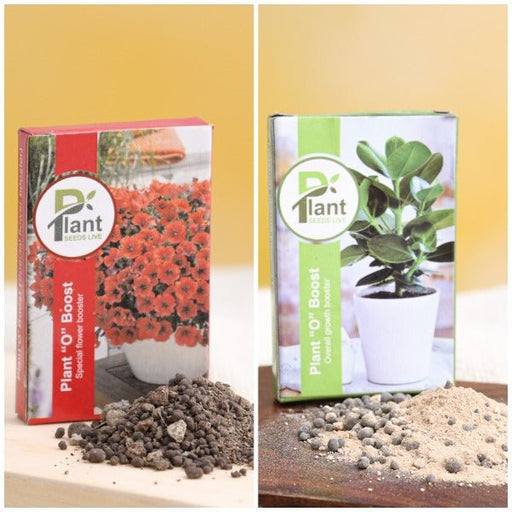
Pack of Plant Growth and Flower Boosters Unlock the full potential of your garden with our Pack of Plant Growth and Flower Boosters! This ...
View full details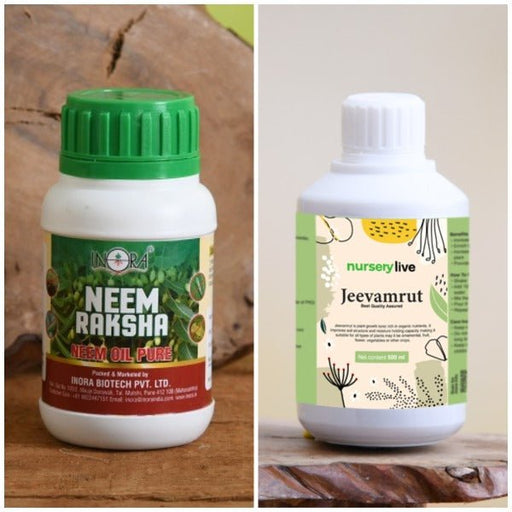 Save 38%
Save 38%
Combo of Jeevamrut and Neem Raksha for Easy Growth and Protection of Houseplants Transform your indoor garden with our exclusive combo of ...
View full details Save 22%
Save 22%
Plant Nutrients Kit (Pack of 16) for a Healthy Garden Transform your garden into a lush paradise with our Plant Nutrients Kit, featuring 1...
View full details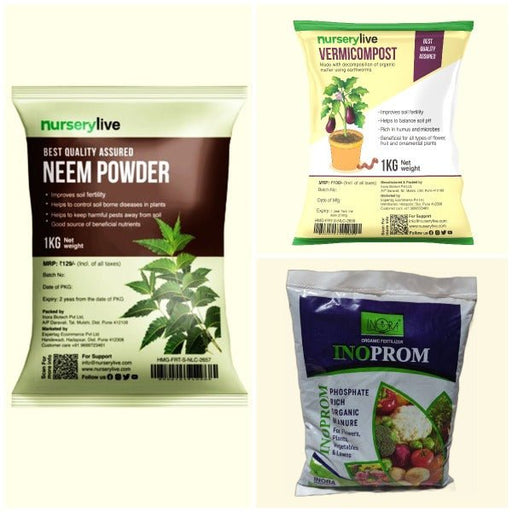 Save 16%
Save 16%
Combo of Top Plant Fertilizers Elevate your gardening game with our exclusive Combo of Top Plant Fertilizers, featuring two bags of premiu...
View full details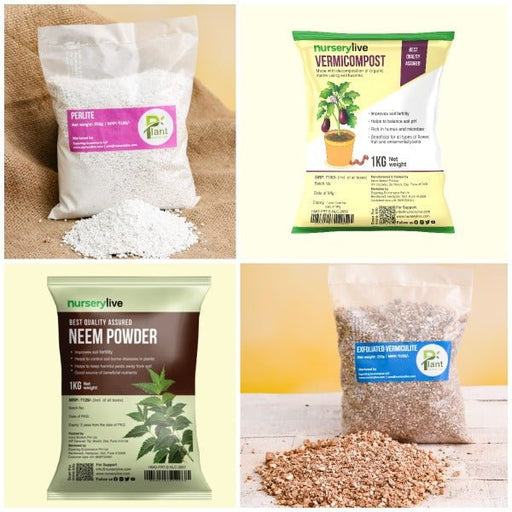 Save 24%
Save 24%
Pack of 4 Additives to Make Soil Healthy and Nutrient Rich Transform your garden into a thriving ecosystem with our Pack of 4 Additives de...
View full details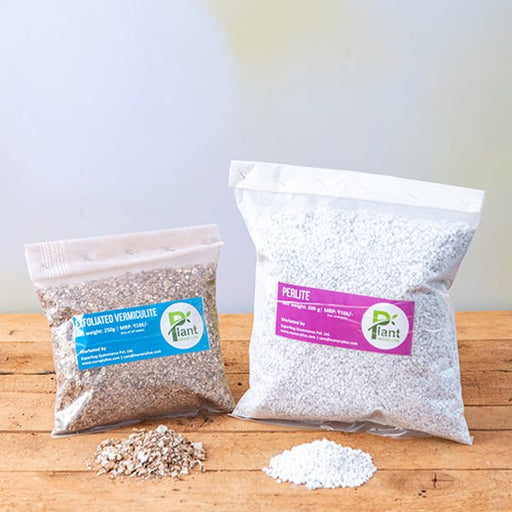 Save 30%
Save 30%
Transform your gardening experience with our premium Combo of Perlite and Vermiculite. This unique blend is designed to enhance soil aeration and ...
View full details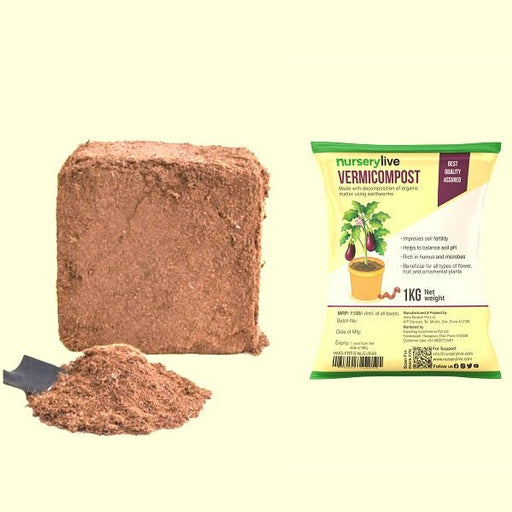 Save 27%
Save 27%
Combo of 2 Vermicompost and Cocopeat - Enrich Your Soil Naturally! Transform your garden into a thriving ecosystem with our Combo of 2 Ver...
View full details
 Save 35%
Save 35%
Best 6 Plants for Perfect Indoor Garden Transform your living space into a lush oasis with our curated collection of the Best 6 Plants for a...
View full details
 Save up to 50%
Save up to 50%
Mini Succulent Garden Pack Transform your space with our Mini Succulent Garden Pack, featuring a delightful collection of 4 any variety beautiful s...
View full details
 Save 30%
Save 30%
5 Best Fragrant Plants Transform your garden or indoor space into a fragrant paradise with our curated selection of the 5 Best Fragrant Plants. Th...
View full details
 Save 24%
Save 24%
Set of 2 Bonsai Looking Grafted Adeniums Transform your indoor or outdoor space with our exquisite Set of 2 Bonsai Looking Grafted Adenium...
View full details Save 45%
Save 45%
Top 4 Die Hard Succulents Pack Transform your indoor or outdoor space with our Top 4 Die Hard Succulents Pack, featuring a curated selecti...
View full details
 Save 30%
Save 30%
5 Best Indoor Plants Pack Transform your living space into a lush oasis with our '5 Best Indoor Plants Pack.' This carefully curated collection fe...
View full details
 Save 25%
Save 25%
Set of 4 Evergreen Air Purifier Plant Pack Transform your indoor space into a lush, green oasis with our Set of 4 Evergreen Air Purifier Pla...
View full details| SrNo | Item Name |
|---|---|
| 1 | Dipterocarpus alatus |
Description: Dipterocarpus alatus, commonly known as the 'Meranti' or 'Red Meranti,' is a majestic tropical hardwood tree native to Southeast Asia. This towering tree can reach heights of up to 60 meters and is characterized by its distinctive winged seeds and large, glossy leaves. Renowned for its durability and strength, Dipterocarpus alatus is a vital component of tropical forests, providing habitat for diverse wildlife and contributing to the ecosystem's health.
Why It's Special: Dipterocarpus alatus is not only valued for its timber but also plays a crucial role in carbon sequestration, making it an essential species in combating climate change. Its wood is highly sought after in the construction and furniture industries due to its resistance to decay and insect damage. Additionally, the tree's seeds are a food source for various bird species, enhancing biodiversity.
Special Feature: One of the most remarkable features of Dipterocarpus alatus is its unique seed structure, which has two wings that allow it to glide through the air, aiding in seed dispersal. This adaptation ensures the propagation of the species across vast areas, contributing to forest regeneration and resilience.
This tree thrives in tropical rainforests, where it enjoys the company of other flora and fauna. Picture it lounging in the shade of its leafy friends, sipping on sunlight and soaking up moisture like a true diva. It prefers well-drained soils, so no soggy feet for this beauty!
Beyond its stunning stature, this tree is a multitasker. Its timber is prized for construction and furniture, while its resin is a sticky delight for traditional medicine. Who knew a tree could be so resourceful? It’s like the Swiss Army knife of the forest!
Fasten your seatbelts! This tree can grow up to 60 meters tall in just a few decades. It’s the overachiever of the plant world, reaching for the sky while others are still figuring out how to sprout.
With great height comes great responsibility. This majestic tree faces threats from deforestation and habitat loss. Conservation efforts are like a superhero cape, swooping in to save the day and ensure future generations can marvel at its grandeur.
The leaves of this tree are like nature’s green umbrellas, providing shade and shelter for countless critters. They’re large, glossy, and oh-so-chic, making them the envy of the forest fashion scene.
When it comes to flowers, Dipterocarpus alatus doesn’t hold back. Its blooms are a spectacle, attracting pollinators like bees and butterflies. It’s the floral equivalent of a red carpet event, drawing in all the buzz!
The timber from this tree is not just any wood; it’s a sought-after material for builders and craftsmen. Strong, durable, and with a touch of elegance, it’s the lumber that dreams are made of, perfect for creating everything from sturdy beams to exquisite furniture.
This tree is a vital player in its ecosystem, providing habitat and food for various wildlife. It’s like the generous host of a forest party, ensuring everyone has a place to hang out and snack on its fruits.
The resin of Dipterocarpus alatus is a sticky substance with a multitude of uses. From traditional medicine to incense, it’s the tree’s way of saying, “I’ve got your back!” It’s nature’s very own adhesive, bonding people and cultures together.
Found primarily in Southeast Asia, this tree is a true globetrotter of the plant kingdom. It’s like the wanderlust-filled friend who’s always off exploring new territories, spreading its seeds and charm wherever it goes.
Propagating this tree is like playing matchmaker in the plant world. It can be grown from seeds or cuttings, ensuring that its legacy continues. Just a little TLC, and you’ll have a mini Dipterocarpus alatus ready to take on the world!
In many cultures, this tree is more than just a pretty face; it holds cultural and spiritual significance. It’s often revered in local traditions, making it a beloved figure in the community, like the wise elder who shares stories of the past.
Dipterocarpus alatus, also known as the 'meranti' or 'red meranti,' is a majestic tropical tree native to Southeast Asia. With its towering height and impressive canopy, it’s like the skyscraper of the forest, providing habitat for countless critters and a source of valuable timber. Who knew trees could be so popular
You can find Dipterocarpus alatus in the lush rainforests of Malaysia, Indonesia, and Thailand. It thrives in well-drained soils and loves a good tropical climate. If you’re planning a tree-hugging expedition, these regions are the VIP lounges for this magnificent species. Just remember to bring your best tree-hugging skills!
Dipterocarpus alatus is a multitasker! Its timber is prized for construction, furniture, and even boat-making. Plus, the tree produces a resin that’s used in varnishes and incense. Talk about a tree that knows how to diversify its portfolio! It’s the Swiss Army knife of the forest, always ready for action.
While Dipterocarpus alatus isn’t currently classified as endangered, it faces threats from deforestation and habitat loss. So, it’s like that popular kid in school who needs to watch out for bullies. Conservation efforts are crucial to ensure this tree continues to thrive and grace our forests for generations to come.
Dipterocarpus alatus can reach impressive heights of up to 60 meters! That’s taller than your average high-rise building. It’s like the tree version of a basketball player, towering over its peers and making a statement in the forest. Just imagine the view from the top—nature’s very own observation deck!
Dipterocarpus alatus can live for over 100 years, making it a true long-term resident of the forest. It’s like the wise old sage of the tree world, witnessing the changing seasons and the antics of forest life. Talk about a tree with stories to tell—if only it could talk!
Dipterocarpus alatus reproduces through seeds, which are dispersed by wind and animals. It’s like a nature-wide game of hide and seek, with seeds finding cozy spots to sprout. Once they take root, they’re ready to grow into the next generation of towering giants. Nature sure knows how to keep things interesting!
Dipterocarpus alatus plays a vital role in its ecosystem by providing habitat and food for various wildlife. Its large canopy offers shade and shelter, while its fallen leaves enrich the soil. It’s like the ultimate host at a forest party, ensuring everyone has a good time and leaves happy!
While Dipterocarpus alatus is a stunning tree, it’s not exactly a garden variety. It prefers the wild, tropical forests where it can stretch its limbs. If you have a vast estate and a love for towering trees, go ahead! Just be prepared for a tree that might overshadow your garden gnomes.
The wood of Dipterocarpus alatus is known for its durability and strength, making it a favorite for construction and furniture. It has a beautiful reddish-brown hue that adds a touch of elegance to any project. It’s like the James Bond of woods—stylish, strong, and always in demand!
Absolutely! Dipterocarpus alatus is a fantastic candidate for reforestation projects. Its fast growth and ability to thrive in various conditions make it a hero in restoring degraded forests. It’s like the superhero of the tree world, swooping in to save the day and bring life back to barren lands!
Dipterocarpus alatus faces threats from deforestation, illegal logging, and climate change. It’s like a tree trying to navigate a minefield of challenges. Conservation efforts are essential to protect this magnificent species and ensure it continues to flourish in its natural habitat. Let’s rally together to be its champions!